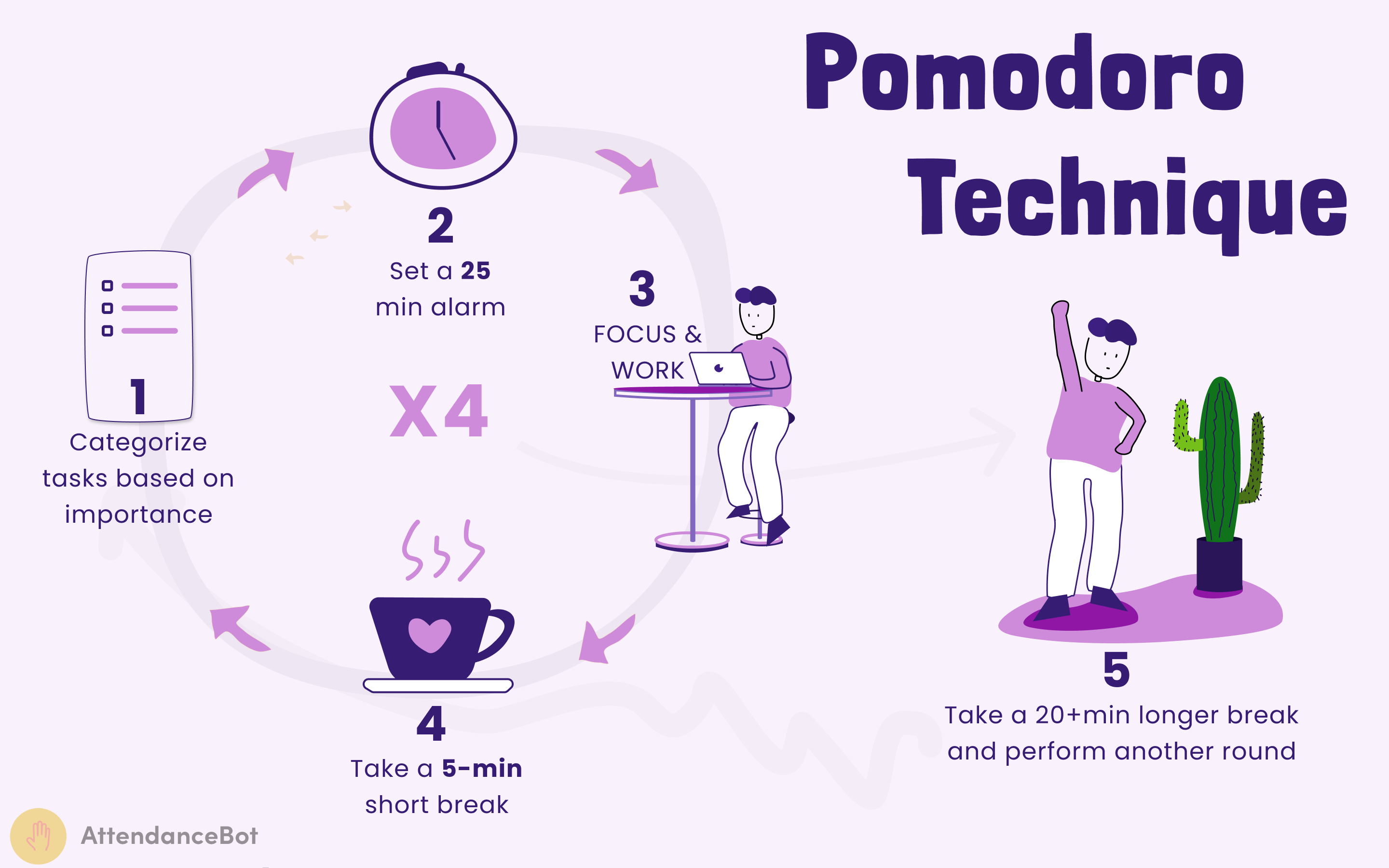In a world full of distractions and never-ending to-do lists, managing time effectively feels like a superpower. That’s where the Pomodoro Technique comes in—a deceptively simple yet incredibly powerful time management method that breaks work into focused 25-minute intervals. Imagine turning a kitchen timer into your secret weapon against procrastination, scattered attention, and burnout. In this guide, we’ll show you how the Pomodoro Technique works, why it’s so effective, and how you can use it to unlock new levels of productivity. Ready to stop racing against time and start working with it? Let’s dive in!
What is the Pomodoro Technique?
Pomodoro Technique, also known as the tomato timer technique or just 25 minute timer technique refers to a popular time management hack that breaks your work time into blocks of 25 minutes for maximum focus and productivity, allowing 5 minutes breaks in between sessions.
This 25-minute timer technique was invented by Francesco Cirillo in the late 1980s and was created after a typical cooking alarm of 25 minutes.
The name Pomodoro was inspired by the kitchen alarm that Francesco used to time himself that was shaped like a Pomodoro, which is Italian for tomato.
Pomodoro Technique, since then, has been acknowledged as an effective time management tool that facilitates concentration and reduces distraction.
How does the Pomodoro Technique work?
The 25-minute timer technique or Pomodoro Technique, as created by Francesco Cirillo, works in five steps. It starts when you set a Pomodoro timer for 25 minutes. Here’s a look at the five steps of the Pomodoro technique:

Step 1: Task determination
Choose the task that you need to accomplish in a set time frame. This can be done by writing down all the tasks that you have for the day. The best way to do them is to write them down first in the order of importance, and then decompose them into Pomodoros or 25-minute segments.
Step 2: Set a timer
Set a timer for 25 minutes, nothing more and nothing less. There is something magical about having a period of 25 minutes. It’s neither too long to make you restless nor too short that you cannot accomplish something meaningful. And while 25 minutes may sound arbitrary, it has stood the test of time.
Step 3: Focus
Focus all your energy and work on the task continuously till your time is up and the alarm starts to ring. Cell phones are not recommended here as they come with all the other distractions. Thus, a table clock or a kitchen alarm is your best pick which would be a constant visual reminder about how much time is left in the current block.
Step 4: Short break
Take a short break of 5 minutes which also marks the completion of one Pomodoro or period of 25 minutes. These breaks are not only important for your mind to recover from the last Pomodoro, but also to prepare you for the next one.
Step 5: Long break
After every four Pomodoros, take a long break of twenty minutes or more, depending on your schedule. Utilize these breaks to grab a bite, read a book, or just close your eyes and take a power nap. These breaks are necessary to refresh and recharge you for your next lot of Pomodoros.
Repeat the steps until you have achieved all your tasks. This technique not only ensures effective completion but utmost concentration without burning out, because of the short and long breaks therein. Lack of distraction further helps.
Whom does Pomodoro Technique work for?
The 25-minute timer technique or Pomodoro Technique works best for those who get distracted easily and are not able to achieve their objectives despite giving requisite hours. Giving a fixed number of hours does not mean that those hours are necessarily productive. That’s where the Pomodoro Technique comes in handy.

Following are the types of people who can benefit from the technique:
- People who get easily distracted by things around them
- People who have been given regular hours but have a low productivity rate
- People who lack focus
- People who are not motivated enough to complete tasks
It is also important to understand the types of distractions that the Pomodoro Technique strives to counter.
There are two types of distractions: external and internal.
The former refers to distractions such as a colleague asking a question or you attending phone calls or attending meetings.
On the other hand, the latter refers to the impulse to read emails as soon as they come, or inability to defer communications even if they are not of immediate importance. Internal distraction also includes distractive thoughts, procrastination, and the likes.
Pomodoro Technique is an effective way to counter the aforementioned hiccups in a working day and ensure that you perform to the best of your ability.
What are the benefits of the Pomodoro technique?
Let’s take an example of an organization to explain this better.
Every organization has multiple departments which further hires a number of employees to complete various tasks. It is important for each employee to be efficient with time management tools so as to make the most of the working hours. They also need to utilize their time in a way that they can prioritize their work and get more done together.
Pomodoro Technique or Pomodoro timer technique provides many benefits in such cases, especially if you or your employees are not able to manage time efficiently or have too many tasks to take care of.
Here are some of the benefits of the 25-minute timer technique:
- Efficient time management and avoidance of distractions
- Enhances employee productivity
- Enhances employee accountability
- Improves planning and innovation prowess with practice
- Keeps the employees motivated as they achieve daily goals
- Keeps employees in the prime of their health due to reduced work stress
- Helps use will power in a better manner as one knows what to prioritize, whether in terms of communication or in terms of tasks
- Enables you to stop fighting the clock and exhausting yourself by racing against the time
- Improves the quality and quantity of your work
- Helps in an objective self-evaluation
The Pomodoro Technique is the best way to manage time and get more out of the day. Whether it’s you or your employees, implementation of the 25-minute timer technique or Pomodoro timer technique ensures that time is being utilized in the most efficient manner possible. Even when the things around or the number of tasks being assigned to us are not changing.
What are the activities one can pursue during a Pomodoro Technique break?
Productivity can only be enhanced when one is well-rested and takes enough breaks in between tasks to refresh the mind. Thus while implementing the Pomodoro Technique, the 5 minute short breaks and the 20 minutes longer breaks are as important.
As the proverb goes, “all work and no play makes Jack a dull boy.”

Here are a few things that you can do during those breaks to rejuvenate yourself:
- Exercising: You can do a little exercise to just loosen up your body. A little stretching exercise at your desk would do as well. There are many desk exercises that can help you freshen up in minutes.
- Meditate: Just close your eyes and meditate. Nothing rejuvenates the mind more than just a few minutes of going into nothingness and emptying it of every chaos outside. You can use apps like Calm or InsightTimer to guide your 5-minute meditation.
- Reading: Catch up on your favourite read for some time. If it is a short break, read some pages of your self-help or feel-good book. If it is a long one, use it to catch up with your fiction works.
- Napping: Nothing’s better than a power nap to help you come back stronger. You will be surprised to know how much a short nap helps, even during working hours. However, ensure that you set an alarm and wake up in time to go through your Pomodoro schedule.
- Eating: We often make the mistake of eating in the midst of our tasks, thus not doing either of the things properly. Set your work aside and use your break to eat at ease. Savour each bite and just relax.
- Listening to music: Play your favourite song and just sit back and relax. Given most of the songs are equal to the short-break duration of a Pomodoro technique, you may not even need a study timer for that. For longer breaks, you can probably jog a little or have your tea break with your favourite playlist.
Your breaks are as important as the tasks themselves. It is important that you utilize them as efficiently as the working hours. Together, they create productive hours which have to be managed well in accordance with the Pomodoro method.
Why is it important to manage time effectively?
Time is finite, but the possibilities are infinite. If you use the right technique, you can churn the most out of your day, without sacrificing your mental and physical health for it. Pomodoro Technique is a way to help you achieve that.
But if you’re wondering that scheduling your day into 25-minute sprints is all too overwhelming or too much of an effort, here’s why we stress on trying it out once at least – you’ll know time management better than ever before!
- Goals can be achieved faster
- Time management helps end indecisiveness
- It helps to make you do more in less time, without compromising on the quality
- It helps you prioritize tasks and inculcates better work management skills
- It makes work fulfilling and you’re happier about it
- Better time management helps boost confidence
- It infuses one with endless energy to do more
- Reduces stress and increases happiness on the personal front
Time management is an extremely useful yet underrated aspect. Pomodoro Technique is one way to achieve it effectively so that you can inculcate all the aforementioned benefits in your life; personal and professional.
When does the Pomodoro method not work?
Just like all the other time management and productivity hacks, there are a number of critics who believe the Pomodoro method is not effective. Here are some drawbacks of Pomodoro Technique:
- Difficult to decompose tasks into 25 minute intervals: The most popular argument against the Pomodoro method is that when there are a number of tasks at hand or multiple people involved, segregating the time into effective slots can be difficult.
- No uniformity: Not every employee can be judged on the basis of the Pomodoro technique, given everyone’s productivity and capacity to work differs. One might complete 80% of their task in 25 minutes, while the other may still be at 20%.
- Too many breaks: This can be counterproductive, especially if the tasks are not small enough to be completed in 25 minutes. In some cases, breaks after every 25 minutes can prove to be a bigger distraction and can even break the flow.
The best way to know whether or not the Pomodoro method would work for you is by implementing it for a fixed period of time. If you are implementing it in your organization, the best way would be to take employee feedback or conduct a survey to see how many of them liked or felt the time management hack was effective.
What tools can be used for the Pomodoro Technique?
One can use both digital and non-digital tools for the 25-minute timer technique or Pomodoro timer technique. However, it is recommended that one uses non-digital or traditional tools as those do not act as distractions.

Here are a few non-digital or traditional tools that can be used for the Pomodoro method:
- Kitchen timer
- Study timer
- Alarm clock
- Hourglass
On the contrary, digital tools refer to the applications on your smartphone. Here are a few Pomodoro apps to try:
- Focus To-do
- Pomotodo
- Engross
- Tomato Timer
- Flat Tomato
Remember that tools and techniques are as effective as the person using them. Thus, while the Pomodoro timer technique is a good time management method, it is equally important to be diligent while applying it.
When we say no distractions, we mean it. Not even that message from your friend!
Frequently asked questions about the Pomodoro Technique
If you still have a lot of questions about the Pomodoro technique, read on. We’ve brought together frequently asked questions here and answered them in the best way possible.
How can I achieve my goals with Pomodoro technique?
The best way to achieve your goals is to manage time well and be persistent about your tasks. With a technique like the Pomodoro method, you have a set way of getting your tasks done and your work accomplished. You have to be persistent and dedicated enough to avoid distractions and concentrate so that the technique works well for you.
What are the alternative frameworks for Pomodoro technique?
Pomodoro Technique or the 25 minute timer technique comes in the category of scientific time management methods known as timeboxing. Some other time boxing techniques to try are
- 90/30 technique: This is quite similar to the Pomodoro method but changes the time duration from 25 and 5 to 90 and 30. Thus there are fewer blocks of time.
- Power hour: This one is quite different from both 90/30 and Pomodoro Technique in the sense that it focuses on only one productive session in the day rather than multiple ones.
- Flowtime technique: This technique germinated out of the disadvantages of the Pomodoro method. As the name suggests, it does not break your tasks into definitive blocks of time. Instead, it encourages you to work and take a break as your body’s natural flow of fatigue tells you to.
Who are the people who can’t take advantage of the Pomodoro technique?
If you are someone whose single task takes more concentration and focus than the 25-minute slot that Pomodoro technique asks for, you are better off with some other timeboxing method. This is because breaks after every 25 minutes will break your flow. Rather than refreshing you, it will end up building more pressure and increasing stress levels.
Are you ready to implement the Pomodoro Technique?
As mentioned earlier, a tool is as efficient as the one wielding it. Pomodoro Technique is a proven time management technique, but only once it is implemented effectively. So try to first read up extensively on it, identify what your typical day looks like and where you’d like to implement it.
Have you tried the 25-minute timer technique or Pomodoro timer technique and did it work for you? Do tell us on Twitter by tagging us at @HarmonizeHQ.



